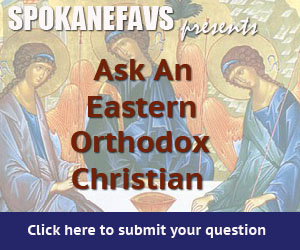What would you like to know about the Eastern Orthodox Christian faith? Submit your question.
Do Eastern Orthodox Christians believe praying to the Saints is more beneficial than praying to God? Do they pray to certain saints for certain problems? This seems superstitious.
 The definition of superstitious would be a belief or way of behaving that is based on fear of the unknown and faith in magic or luck: a belief that certain events or things will bring good luck or bad luck like a game of chance as in rolling the dice.
The definition of superstitious would be a belief or way of behaving that is based on fear of the unknown and faith in magic or luck: a belief that certain events or things will bring good luck or bad luck like a game of chance as in rolling the dice.
The Eastern Orthodox Church is not superstitious about any of its practices, beliefs, or teachings. However, there are mysteries in the faith that can’t be explained with our finite intellect.
Eastern Orthodox Christians do not believe that praying to the Saints “is more beneficial” than praying to God. Nowhere in the Scriptures is this implied. However, praying with and to the saints has always been a practice in the church from the beginning of Christianity.
All Christians could be called saints through the work of the Holy Trinity; we ask our father in heaven to accept, on our behalf, “the prayers and the intercession” of the Saints to pray for us and with us.
In the early Church, St. Paul when writing to the churches he had visited, calls all the faithful “saints.” The fact that Christians ask the intercessory prayer of saints is prefigured in the New Testament when Saint Paul addresses the Christian Ephesians, Thessalonians, Colossians and Romans to pray for him (Ephes. 6:19, 1 Thess 5:25; Col 4:3, and Rom 15:30-31).
Praying to the saints about certain ailments or illnesses is not a superstitious request. A particular saint either before or after their departure from this world, may have been given special “grace” or “favor” to perform miracles concerning the curing of cancer, blindness, or many other concerns. So if I had cancer, I would be more prone to pray to that saint that was associated with many miracle cures of cancer.
St. Paul asked other Christians to pray for him (2 Thessalonians 3: 1-4); just as the earliest Christians called St. Peter to come and pray when Tabitha had died, and by his prayers, God granted Tabitha new life (Acts 9: 36-43).
So why didn’t they just pray directly to God, rather than asking another to come and pray for them? There are other references of “with the prayers of the saints” see Rev 8: 3, Rev 5: 8. These prayers were not directly offered to God, but through intercessors of angels and saints.






